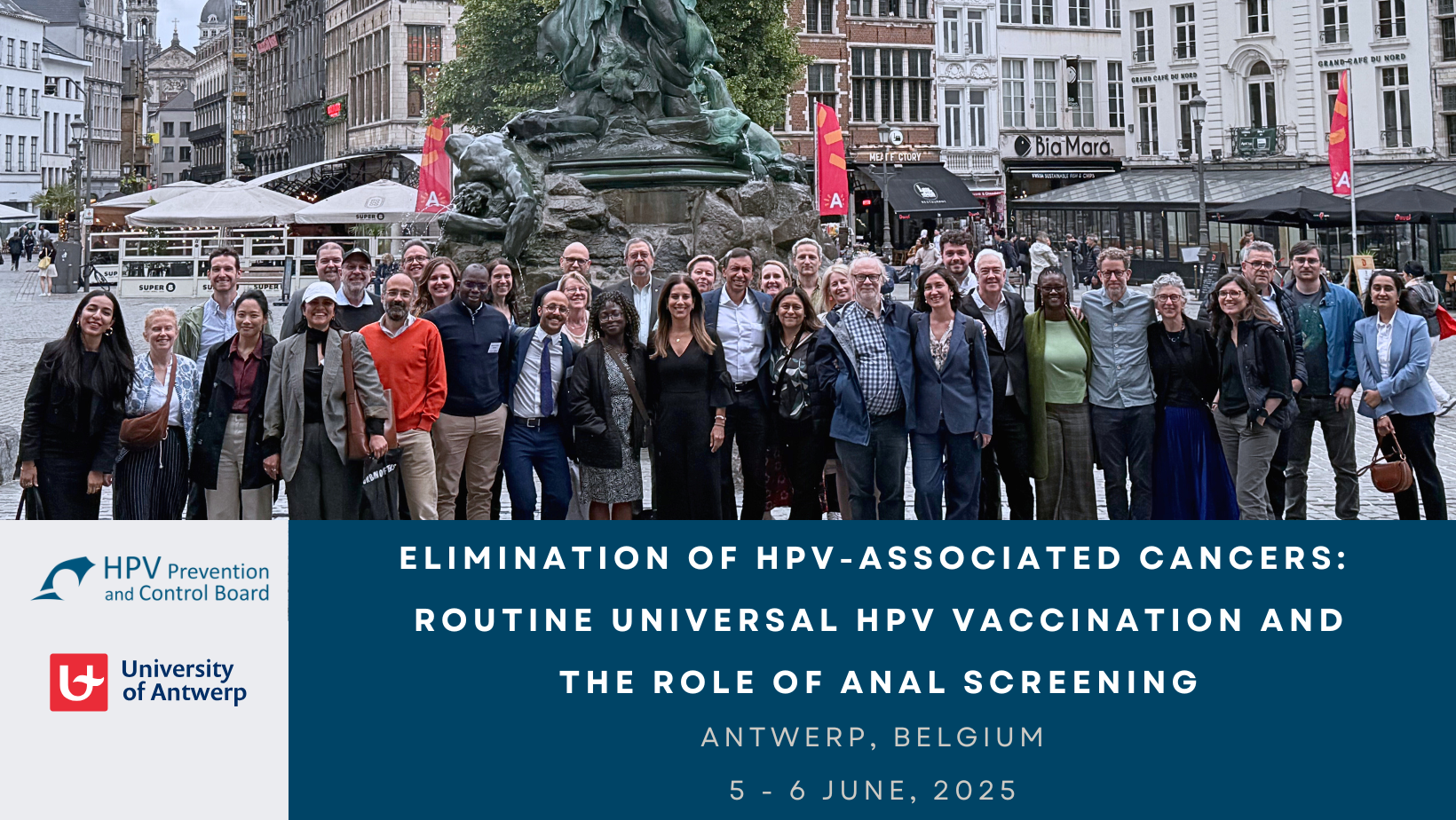Technical Meeting:
Elimination of HPV-associated Cancers: Routine Universal HPV Vaccination and the Role of Anal Screening
Antwerp, Belgium – 2025
Meeting Objectives
- Burden of HPV-Related Disease
-
- Review the epidemiological data and scope of HPV-related morbidity in females and males and their respective anatomical site burden.
- Discuss available evidence in HPV natural history in males.
- Examine the extent of impact by which male cohorts vaccination can reduce HPV-related disease both directly and indirectly (through herd protection).
- HPV Vaccine Safety, Efficacy, and Effectiveness in male cohorts
- Present up-to-date clinical and real-world data on the safety profile and immunogenicity of HPV vaccines in male cohorts.
- Discuss vaccine effectiveness data specific to preventing HPV-related diseases in male cohorts.
- Implementation Feasibility, Equity, and Lessons Learned from routine universal HPV vaccine implementation
- Draw parallels to historical shifts in other vaccination programs, such as the transition of hepatitis B vaccination from risk groups to infant immunization schedules and rubella vaccination from adolescent girls to universal childhood immunization, and how these precedents can guide HPV vaccination strategies.
- Asses the current HPV vaccine global supply and forecasted to understand and promote informed decision making
- Present real-world examples from various countries to illustrate the considerations of this policy in their respective contexts.
- Assess the implementation, cost-effectiveness, and equity considerations that inform policy for the adoption of routine universal HPV vaccination policies.
- Explore facilitators and barriers to achieving equitable coverage and program resilience.
- Anal Cancer Screening and Assessing Impact
- Review emerging and established guidelines for anal canal screening continuum, including recommendations (target, sample collection, laboratory testing methodologies, treatment, triage) to ensure comprehensive care and high-quality data.
- Discuss how non-cervical screening (anal cancer screening) initiatives could be integrated to better capture the population-level impact of vaccinating male cohorts.
- Understand and discuss the status and steps towards implementation considering resource allocation, workforce training, infrastructure needs, and strategies to promote equitable access.
- MDEON Visa Number: (25/V2/16327/010117)

DAY 1 – Thursday, June 5, 2025
SESSION 1: WELCOME SESSION
Chairs: Alex Vorsters (University of Antwerp)
- Welcome and Introduction – 10 years of HPV Prevention and Control Board
Alex Vorsters (University of Antwerp) (Pdf, Video) - Setting the scene – Eliminahttps://youtu.be/oYzYuMaMntotion of HPV-associated Cancers: Routine Universal HPV Vaccination and the Role of Anal Screening.
Ricardo Burdier (HPV Board Scientific Secretariat) (Pdf, Video)
SESSION 2: HPV-RELATED DISEASE: WHERE ARE WE NOW IN NUMBERS?
Chairs: Raúl Murillo (Centro Javeriano de Oncología) & Marc Arbyn (Sciensano)
SESSION 3: CURRENT LANDSCAPE OF ANAL CANCER SCREENING
Chairs: Adrian Curran (Infectious Diseases Department, Vall d’Hebron University Hospital) & Dorothy Machalek (Kirby Institute)
- Epidemiology of HPV-related disease in the anal canal: similarities and differences with the cervix
Gary Clifford (IARC) (Pdf, Video) - Prevention of HPV-related disease of the Anus: Primary and Secondary Prevention
Joel Palefsky (UCSF) (Pdf, Video) - Anal Cancer Screening Guidelines: Evidence and Practical Implications
Nicolas Wentzensen (IANS) (Pdf, Video)
Panel Discussion: Advancing Anal Cancer Screening: Evidence-Based Approaches and Real-World Challenges
Panelists:
(Video)
SESSION 4: HPV VACCINATION IN MALE COHORTS: SAFETY, EFFICACY AND IMPACT
Chairs: Eduardo Franco (McGill University) & Nelly Mugo (KEMRI)
- Natural History of HPV infection in Males: What do we know?
Dorothy Machalek (Kirby Institute) (Pdf, Video) - HPV vaccination in male cohorts: Safety and Immunogenicity
Anna Giuliano (Moffit Cancer Center) (Pdf, Video) - Gender-neutral HPV vaccination –A policy with superb impact
Matti Lehtinen (Karolinska Institute) (Pdf, Video) - Q&A (Video)
SESSION 5: PANEL DISCUSSION ON HPV VACCINE AVAILABILITY, PRICING AND SUPPLY DYNAMICS: INFORMED DECISION-MAKING FOR POLICY & PROCUREMENT
Chairs: Iacopo Baussano (IARC) & Silvia de Sanjosé (ISGlobal)
SESSION 6: PANEL/ ROUND TABLE DISCUSSION: FROM DATA TO POLICY OF ROUTINE UNIVERSAL VACCINATION PROGRAMS (HIC & LMICS)
Chairs: Marc Steben (ISTTDR) & Mario Poljak (University of Ljubljana)
- Historical shifts in other vaccination programs
Pierre Van Damme (University of Antwerp) (Pdf, Video) - Panel Discussion on Global Insights on Routine Universal HPV Vaccination: Lessons from implementing countries
Panelists:
SESSION 7: EMERGING TOPIC DISCUSSION – POLL REQUESTING INPUT
Chairs: HPV Prevention and Control Board Scientific Secretariat
Poll Requesting Input: Participants suggest key questions and themes that they would like to explore further in the Day 2 – breakout session.
DAY 2 – Friday, June 6, 2025
DAY 2: WELCOME SESSION
Chairs: Prof Alex Vorsters (University of Antwerp)
Welcome and overview of day 1 discussions and emerging topics.
SESSION 8: IMPLEMENTATION OF ROUTINE UNIVERSAL HPV VACCINATION & ANAL CANCER SCREENING: FEASIBILITY, EQUITY AND COST-EFFECTIVENESS
Chairs: Maribel Almonte (WHO) & Sharon Hanley (University of Aberdeen)
- Implementation of Anal Cancer Screening: An evidence-based roadmap to successful implementation
Ann Burchell (University of Toronto) (Pdf, Video) - Has the inclusion of male cohorts impacted inequity? Implementation insights from the UK as a pioneer of this policy
Ross Cameron (NHS Scotland) - Modelling inequalities with and without enhanced HPV vaccination efforts
Marc Brisson (Université Laval) (Pdf) - Context-specific modelling in low-resource settings: additional impact and resource to expand to universal HPV vaccination
Irene Man (IARC/WHO) (Pdf, Video) - Q&A & Discussion
SESSION 9: BREAKOUT GROUPS – STRENGTHENING HPV-RELATED CANCER ELIMINATION
- Breakout Group 1: Strengthening HPV Primary Prevention – Expanding Vaccination in Male Cohorts
- Objective: This breakout group will explore strategies and context specific considerations to expand HPV vaccination in male cohorts, addressing prioritization, equity, and supply challenges.
- Emerging topics related to HPV vaccination will be included in this group
- Breakout Group 2: Advancing HPV Secondary Prevention – Anal Cancer Screening and Program Impact
- Objective: This breakout group will focus on identifying key challenges, opportunities, and next steps in optimizing anal cancer screening and triage strategies.
- Emerging topics related to HPV vaccination will be included in this group
- Plenary discussion
SESSION 9: CONCLUSION
Chairs: Pierre Van Damme (University of Antwerp)
